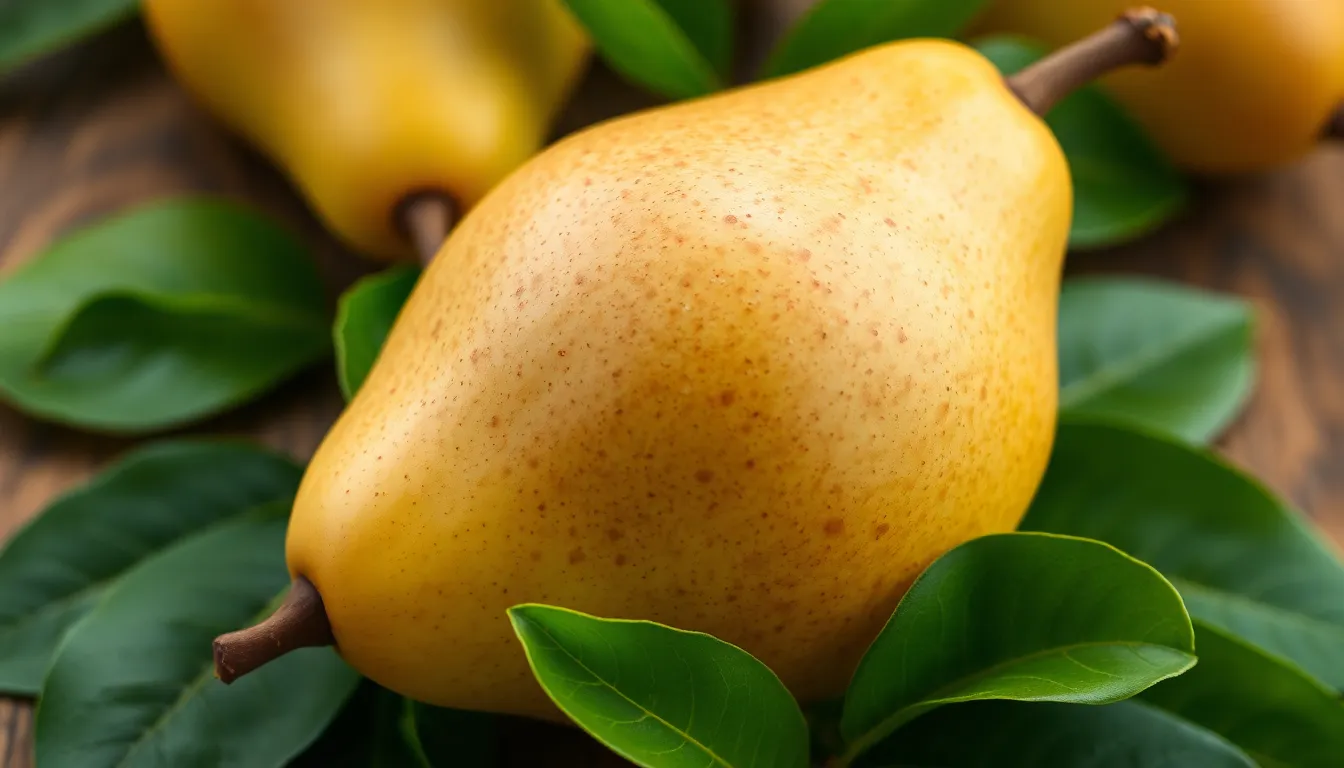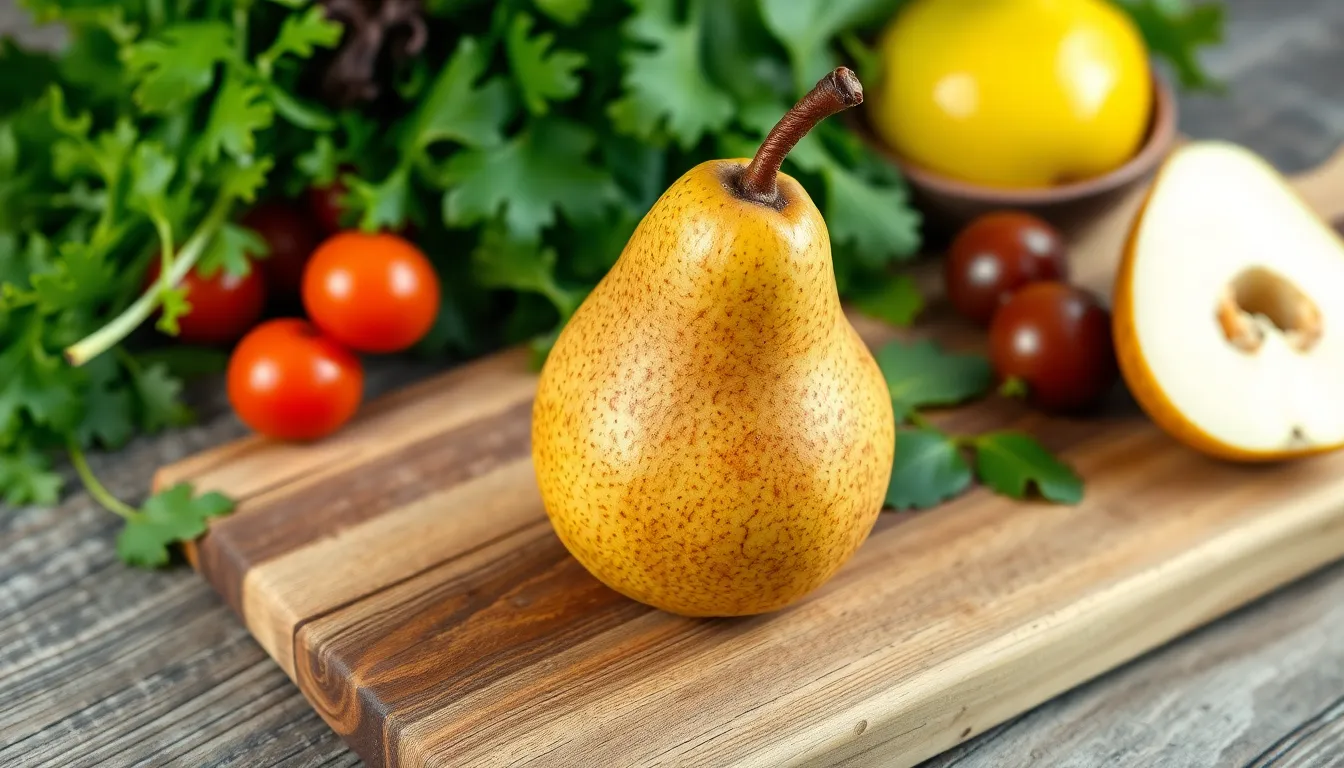Bosc pears might not have the fame of their flashier cousins like the Bartlett, but these brown beauties pack a serious nutritional punch that deserves the spotlight. With their unique shape and sweet, spicy flavor, they’re not just a treat for the taste buds—they’re a secret weapon for health enthusiasts. Who knew a fruit could be both a snack and a superhero in disguise?
Loaded with fiber, vitamins, and minerals, Bosc pears are here to prove that healthy eating doesn’t have to be boring. Whether you’re tossing them in a salad, baking them into a dessert, or just enjoying one fresh off the tree, these pears offer a delicious way to boost your wellness. So, let’s dive into the juicy details of Bosc pear nutrition and discover why this humble fruit should be a staple in everyone’s diet.
Bosc Pear Nutrition
Bosc pears feature a distinctive shape, characterized by their long necks and brownish skin. They possess a sweet and spicy flavor profile, making them a delightful choice for various culinary applications. Nutritionally, Bosc pears are rich in dietary fiber, which aids digestion and helps maintain a healthy weight.
Among their vitamins, they contain significant amounts of vitamin C, an antioxidant that supports the immune system and skin health. Minerals are also present, including potassium, which helps regulate blood pressure levels and supports heart health. One medium-sized Bosc pear provides about 6 grams of fiber and 190 milligrams of potassium.
Incorporating Bosc pears into the diet enhances overall nutrition. Chefs often favor them for salads, where their crisp texture complements leafy greens. Bakers utilize Bosc pears in desserts, as their firmness holds up well during cooking.
Their versatility extends to savory dishes, pairing nicely with cheeses, nuts, and meats. Bosc pears also blend seamlessly into smoothies, adding natural sweetness and nutrients without added sugars.
Regularly consuming Bosc pears can support digestion and overall health. They offer not only flavor but also contribute essential nutrients that the body needs. This often-overlooked fruit deserves recognition for its beneficial impact on daily nutrition.
Nutritional Profile of Bosc Pear

Bosc pears offer a compelling nutritional profile, making them a formidable addition to any diet. They provide essential macronutrients, micronutrients, and healthy components.
Macronutrients
Bosc pears contain approximately 100 calories per medium pear. They consist mainly of carbohydrates, contributing around 27 grams. Dietary fiber stands out with about 5 grams per serving, supporting digestive health. Bosc pears include minimal fat, less than 0.5 grams, making them an excellent fruit choice for low-fat diets. They offer about 1 gram of protein, which complements their carbohydrate content, providing a balanced energy source.
Micronutrients
Bosc pears shine in their vitamin and mineral content. Each medium pear contains about 8% of the Daily Value for vitamin C, crucial for immune health. Potassium also plays a significant role, with about 6% of the Daily Value per serving, important for heart health. In addition to these, they contain smaller amounts of vitamin K, vitamin A, and various B vitamins, which further enhance their nutritional benefits. Antioxidants such as flavonoids are present, promoting overall wellness and disease prevention.
Health Benefits of Bosc Pears
Bosc pears provide several health benefits that contribute to overall well-being. Their rich nutritional content supports various bodily functions and makes them an excellent dietary choice.
Antioxidant Properties
Antioxidants in Bosc pears fight oxidative stress and reduce inflammation. These compounds, including vitamin C, help neutralize free radicals, which can damage cells. By supporting cellular health, Bosc pears play a role in reducing the risk of chronic diseases. Consuming these pears regularly may enhance the body’s ability to combat illnesses, contributing to long-term health.
Digestive Health
Digestive health benefits primarily come from the high fiber content in Bosc pears. Each medium pear contains about 5 grams of dietary fiber, which promotes regular bowel movements. They facilitate the movement of food through the digestive system, reducing the risk of constipation. Additionally, the fiber supports gut bacteria and contributes to a healthy gut microbiome. This impact on digestion underscores the importance of including Bosc pears in a balanced diet.
Heart Health
Heart health benefits derive from the potassium and fiber found in Bosc pears. Potassium helps regulate blood pressure in conjunction with fiber’s role in cholesterol management. Individuals consuming dietary fiber experience lower cholesterol levels, which can decrease the risk of heart disease. Eating Bosc pears regularly promotes cardiovascular health, making them a heart-friendly snack choice.
Incorporating Bosc Pears into Your Diet
Bosc pears add flavor and nutrition to various diets. Their versatility allows for creative culinary applications.
Recipe Ideas
Incorporate Bosc pears into salads for a sweet crunch. Combine sliced pears with mixed greens, walnuts, and feta cheese for a refreshing dish. They work splendidly in desserts too, whether baked into pies or poached in spices. Consider blending them into smoothies for a nutritious beverage. You can also pair Bosc pears with cheeses like Brie or Gouda for a delightful cheese board. Cooking them with savory dishes, such as roasted chicken or pork, brings out their natural sweetness.
Storage Tips
Store Bosc pears at room temperature to promote ripening. Once ripe, refrigerate them to maintain freshness and extend shelf life. Place them in a breathable bag or container to prevent moisture buildup. Avoid stacking Bosc pears to minimize bruising. Check regularly for any signs of spoilage, removing affected fruit to preserve the rest. Keeping pears away from strong-smelling foods in the refrigerator also helps maintain their flavor.
Conclusion
Bosc pears stand out not only for their unique flavor and texture but also for their impressive nutritional benefits. Incorporating them into daily meals can enhance overall health and well-being. Their high fiber content supports digestive health while vitamins and minerals contribute to immune function and heart health.
These versatile fruits can elevate a variety of dishes, making them an excellent choice for anyone looking to boost their nutrition. With simple storage tips to maintain freshness, Bosc pears are both a delicious and practical addition to a balanced diet. Embracing this often-overlooked fruit can lead to delicious culinary experiences and improved health outcomes.

